- Home
- Iain M. Banks
The Player of Games Page 9
The Player of Games Read online
Page 9
He tried to tell himself it was still no proof, that Mawhrin-Skel might still have been lying, but even as he thought that, he saw something ominous in the fact the warship had not replied direct. It had used its GSV, an even more reliable source of information, to confirm its whereabouts.
“Want the rest of the LOU’s message?” Hub said. “Or are you going to bite my head off again?”
Gurgeh was puzzled. “What rest of the message?” he said. The underground car swung round, slowed further. He could see Ikroh’s transit gallery, hanging under the Plate surface like an upside-down building.
“Mysteriouser and mysteriouser,” Hub said. “You been communicating with this ship behind my back, Gurgeh? The message is: ‘Nice to hear from you again.’”
Three days passed. He couldn’t settle to anything. He tried to read—papers, old books, the material of his own he’d been working on—but on every occasion he found himself reading and re-reading the same piece or page or screen, time and time again, trying hard to take it in but finding his thoughts constantly veering away from the words and diagrams and illustrations in front of him, refusing to absorb anything, going back time and time again to the same treadmill, the same looping, tail-swallowing, eternally pointless round of questioning and regret. Why had he done it? What way out was there?
He tried glanding soothing drugs, but it took so much to have any effect he just felt groggy. He used Sharp Blue and Edge and Focal to force himself to concentrate, but it gave him a jarring feeling at the back of his skull somewhere, and exhausted him. It wasn’t worth it. His brain wanted to worry and fret and there was no point in trying to frustrate it.
He refused all calls. He called Chamlis a couple of times, but never found anything to say. All Chamlis could tell him was that the two Contact ships it knew had both been in touch; each said it had passed on Chamlis’s message to a few other Minds. Both had been surprised Gurgeh had been contacted so quickly. Both would pass on Gurgeh’s request to be told more; neither knew anything else about what was going on.
He heard nothing from Mawhrin-Skel. He asked Hub to find the machine, just to let him know where it was, but Hub couldn’t, which obviously annoyed the Orbital Mind a lot. He had it send the drone team down again and they swept the house once more. Hub left one of the machines there in the house, to monitor continuously for surveillance.
Gurgeh spent a lot of time walking in the forests and mountains around Ikroh, walking and hiking and scrambling twenty or thirty kilometers each day just for the natural soporific of being dead, animal-tired at night.
On the fourth day, he was almost starting to feel that if he didn’t do anything, didn’t talk to anybody or communicate or write, and didn’t stir from the house, nothing would happen. Maybe Mawhrin-Skel had disappeared forever. Perhaps Contact had come to take it away, or said it could come back to the fold. Maybe it had gone totally crazy and flown off into space; maybe it had taken seriously the old joke about Styglian enumerators, and had gone off to count all the grains of sand on a beach.
It was a fine day. He sat in the broad lower branches of a sun-bread tree in the garden at Ikroh, looking out through the canopy of leaves to where a small herd of feyl had emerged from the forest to crop the wineberry bushes at the bottom of the lower lawn. The pale, shy animals, stick-thin and camouflage-skinned, pulled nervously at the low shrubs, their triangular heads jigging and bobbing, jaws working.
Gurgeh looked back to the house, just visible through the gently moving leaves of the tree.
He saw a tiny drone, small and gray-white, near one of the windows of the house. He froze. It might not be Mawhrin-Skel, he told himself. It was too far away to be certain. It might be Loash and-all-the-rest. Whatever it was, it was a good forty meters away, and he must be almost invisible sitting here in the tree. He couldn’t be traced; he’d left his terminal back at the house, something he had taken to doing increasingly often recently, even though it was a dangerous, irresponsible thing to do, to be apart from the Hub’s information network, effectively cut off from the rest of the Culture.
He held his breath, sat dead still.
The little machine seemed to hesitate in midair, then point in his direction. It came floating straight toward him.
It wasn’t Mawhrin-Skel or Loash the verbose; it wasn’t even the same type. It was a little larger and fatter and it had no aura at all. It stopped just below the tree and said in a pleasant voice, “Mr. Gurgeh?”
He jumped out of the tree. The herd of feyl started and disappeared, leaping into the forest in a confusion of green shapes. “Yes?” he said.
“Good afternoon. My name’s Worthil; I’m from Contact. Pleased to meet you.”
“Hello.”
“What a lovely place. Did you have the house built?”
“Yes,” Gurgeh said. Irrelevant small-talk; a nano-second interrogation of Hub’s memories would have told the machine exactly when Ikroh was built, and by whom.
“Quite beautiful. I couldn’t help noticing the roofs all slope at more or less the same mean angle as the surrounding mountain slopes. Your idea?”
“A private aesthetic theory,” Gurgeh admitted, a little more impressed; he’d never mentioned that to anybody. The fieldless machine made a show of looking around.
“Hmm. Yes, a fine house and an impressive setting. But now: may I come to the reason for my visit?”
Gurgeh sat down cross-legged by the tree. “Please do.”
The drone lowered itself to keep level with his face. “First of all, let me apologize if we put you off earlier. I think the drone who visited you previously may have taken its instructions a little too literally, though, to give it its due, time is rather limited.… Anyway; I’m here to tell you all you want to know. We have, as you probably suspected, found something we think might interest you. However…” The drone turned away from the man, to look at the house and its garden again. “I wouldn’t blame you if you didn’t want to leave your beautiful home.”
“So it does involve traveling?”
“Yes. For some time.”
“How long?” Gurgeh asked.
The drone seemed to hesitate. “May I tell you what it is we’ve found, first?”
“All right.”
“It must be in confidence, I’m afraid,” the drone said apologetically. “What I’ve come to tell you has to remain restricted for the time being. You’ll understand why once I’ve explained. Can you give me your word you won’t let this go any further?”
“What would happen if I say No?”
“I leave. That’s all.”
Gurgeh shrugged, brushed a little bark from the hem of the gathered-up robe he was wearing. “All right. In secret, then.”
Worthil floated upward a little, turning its front briefly toward Ikroh. “It’ll take a little time to explain. Might we retire to your house?”
“Of course.” Gurgeh rose to his feet.
Gurgeh sat in the main screen-room of Ikroh. The windows were blanked out and the wall holoscreen was on; the Contact drone was controlling the room systems. It put the lights out. The screen went blank, then showed the main galaxy, in 2-D, from a considerable distance. The two Clouds were nearest Gurgeh’s point of view, the larger Cloud a semi-spiral with a long tail leading away from the galaxy, and the smaller Cloud vaguely Y-shaped.
“The Greater and Lesser Clouds,” the drone Worthil said. “Each about one hundred thousand light-years away from where we are now. No doubt you’ve admired them from Ikroh in the past; they’re quite visible, though you’re on the under-edge of the main galaxy relative to them, and so looking at them through it. We’ve found what you might consider a rather interesting game… here.” A green dot appeared near the center of the smaller Cloud.
Gurgeh looked at the drone. “Isn’t that,” he said, “rather far away? I take it you’re suggesting I go there.”
“It is a long way away, and we do suggest just that. The journey will take nearly two years on the fastest ships, due
to the nature of the energy grid; it’s more tenuous out there, between the star-clumps. Inside the galaxy such a journey would take less than a year.”
“But that means I’d be away four years,” Gurgeh said, staring at the screen. His mouth had gone dry.
“More like five,” the drone said matter-of-factly.
“That’s… a long time.”
“It is, and I’ll certainly understand if you decline our invitation. Though we do think you’ll find the game itself interesting. First of all, however, I have to explain a little about the setting, which is what makes the game unique.” The green dot expanded, became a rough circle. The screen went suddenly out-holo, filling the room with stars. The rough green circle of suns became an even rougher sphere. Gurgeh experienced the momentary swimming sensation he sometimes felt when surrounded by space or its impression.
“These stars,” Worthil said—the green-colored stars, at least a couple of thousand suns, flashed once—“are under the control of what one can only describe as an empire. Now…” The drone turned to look at him. The little machine lay in space like some impossibly large ship, stars in front of it as well as behind it. “It is unusual for us to discover an imperial power-system in space. As a rule, such archaic forms of authority wither long before the relevant species drags itself off the home planet, let alone cracks the lightspeed problem, which of course one has to do, to rule effectively over any worthwhile volume.
“Every now and again, however, Contact disturbs some particular ball of rock and discovers something nasty underneath. On every occasion, there is a specific and singular reason, some special circumstance which allows the general rule to go by the board. In the case of the conglomerate you see before you—apart from the obvious factors, such as the fact that we didn’t get out there until fairly recently, and the lack of any other powerful influence in the Lesser Cloud—that special circumstance is a game.”
It took a while to sink in. Gurgeh looked at the machine. “A game?” he said to it.
“That game is called ‘Azad’ by the natives. It is important enough for the empire itself to take its name from the game. You are looking at the Empire of Azad.”
Gurgeh did just that. The drone went on. “The dominant species is humanoid, but, very unusually—and certain analyses claim that this too has been a factor in the survival of the empire as a social system—it is composed of three sexes.” Three figures appeared in the center of Gurgeh’s field of vision, as though standing in the middle of the ragged sphere of stars. They were rather shorter than Gurgeh if the scale was right. Each of them looked odd in different ways, but they shared what looked to Gurgeh to be rather short legs and slightly bloated, flat and very pale faces. “The one on the left,” Worthil said, “is a male, carrying the testes and penis. The middle one is equipped with a kind of reversible vagina, and ovaries. The vagina turns inside-out to implant the fertilized egg in the third sex, on the right, which has a womb. The one in the middle is the dominant sex.”
Gurgeh had to think about this. “The what?” he said.
“The dominant sex,” Worthil repeated. “Empires are synonymous with centralized—if occasionally schismatized—hierarchical power structures in which influence is restricted to an economically privileged class retaining its advantages through—usually—a judicious use of oppression and skilled manipulation of both the society’s information dissemination systems and its lesser—as a rule nominally independent—power systems. In short, it’s all about dominance. The intermediate—or apex—sex you see standing in the middle there controls the society and the empire. Generally, the males are used as soldiers and the females as possessions. Of course, it’s a little more complicated than that, but you get the idea?”
“Well.” Gurgeh shook his head. “I don’t understand how it works, but if you say it does… all right.” He rubbed his beard. “I take it this means these people can’t change sex.”
“Correct. Genetechnologically, it’s been within their grasp for hundreds of years, but it’s forbidden. Illegal, if you remember what that means.” Gurgeh nodded. The machine went on. “It looks perverse and wasteful to us, but then one thing that empires are not about is the efficient use of resources and the spread of happiness; both are typically accomplished despite the economic short-circuiting—corruption and favoritism, mostly—endemic to the system.”
“Okay,” Gurgeh said. “I’ll have a lot of questions to ask later, but go on. What about this game?”
“Indeed. Here is one of the boards.”
“… You’re joking,” Gurgeh said eventually. He sat forward, gazing at the holo still picture spread before him.
The starfield and the three humanoids had vanished, and Gurgeh and the drone called Worthil were, seemingly, at one end of a huge room many times larger than the one they in fact occupied. Before them stretched a floor covered with a stunningly complicated and seemingly chaotically abstract and irregular mosaic pattern, which in places rose up like hills and dipped into valleys. Looking closer, it could be seen that the hills were not solid, but rather stacked, tapering levels of the same bewildering meta-pattern, creating linked, multilayered pyramids over the fantastic landscape, which, on still closer inspection, had what looked like bizarrely sculpted game-pieces standing on its riotously colored surface. The whole construction must have measured at least twenty meters to a side.
“That,” Gurgeh asked, “is a board?” He swallowed. He had never seen, never heard about, never had the least hint of a game as complicated as this one must surely be, if those were individual pieces and areas.
“One of them.”
“How many are there?” It couldn’t be real. It had to be a joke. They were making fun of him. No human brain could possibly cope with a game on such a scale. It was impossible. It had to be.
“Three. All that size, plus numerous minor ones, played with cards as well. Let me give you some of the background to the game.
“First, the name; ‘Azad’ means ‘machine,’ or perhaps ‘system,’ in the wide sense which would include any functioning entity, such as an animal or a flower, as well as something like myself, or a water-wheel. The game has been developed over several thousand years, reaching its present form about eight hundred years ago, around the same time as the institutionalization of the species’ still extant religion. Since then the game has altered little. It dates in its finalized form, then, from about the time of the hegemonization of the empire’s home planet, Eä, and the first, relativistic exploration of nearby space.”
Now the view was of a planet, hanging huge in the room in front of Gurgeh; blue-white and brilliant and slowly, slowly, revolving against a background of dark space. “Eä,” the drone said. “Now; the game is used as an absolutely integral part of the power-system of the empire. Put in the crudest possible terms, whoever wins the game becomes emperor.”
Gurgeh looked round slowly at the drone, which looked back. “I kid you not,” it said drily.
“Are you serious?” Gurgeh said, nevertheless.
“Quite entirely,” the drone said. “Becoming emperor does constitute a rather unusual… prize,” the machine said, “and the whole truth, as you might imagine, is much more complicated than that. The game of Azad is used not so much to determine which person will rule, but which tendency within the empire’s ruling class will have the upper hand, which branch of economic theory will be followed, which creeds will be recognized within the religious apparat, and which political policies will be followed. The game is also used as an exam for both entry into and promotion within the empire’s religious, educational, civil administrational, judicial and military establishments.
“The idea, you see, is that Azad is so complex, so subtle, so flexible and so demanding that it is as precise and comprehensive a model of life as it is possible to construct. Whoever succeeds at the game succeeds in life; the same qualities are required in each to ensure dominance.”
“But…” Gurgeh looked at the drone beside him
, and seemed to feel the presence of the planet before them as an almost physical force, something he felt drawn to, pulled toward, “is that true?”
The planet disappeared and they were back looking at the vast game-board again. The holo was in motion now, though silently, and he could see the alien people moving around, shifting pieces and standing around the edges of the board.
“It doesn’t have to be totally true,” the drone said, “but cause and effect are not perfectly polarized here; the set-up assumes that the game and life are the same thing, and such is the pervasive nature of the idea of the game within the society that just by believing that, they make it so. It becomes true; it is willed into actuality. Anyway; they can’t be too far wrong, or the empire would not exist at all. It is by definition a volatile and unstable system; Azad—the game—would appear to be the force that holds it together.”
“Wait a moment now,” Gurgeh said, looking at the machine. “We both know Contact’s got a reputation for being devious; you wouldn’t be expecting me to go out there and become emperor or anything, would you?”
For the first time, the drone showed an aura, flashing briefly red. There was a laugh in its voice, too. “I wouldn’t expect you’d get very far trying that. No; the empire falls under the general definition of a ‘state,’ and the one thing states always try to do is to ensure their own existence in perpetuity. The idea of anybody from outside coming in and trying to take the empire over would fill them with horror. If you decide you want to go, and if you are able to learn the game sufficiently well during the voyage, then there might be a chance, we think, going on your past performance as a game-player, of you qualifying as a clerk in the civil service, or as an army lieutenant. Don’t forget; these people are surrounded by this game from birth. They have anti-agatic drugs, and the best players are about twice your own age. Even they, of course, are still learning.
“The point is not what you would be able to achieve in terms of the semi-barbarous social conditions the game is set up to support, but whether you can master the theory and practice of the game at all. Opinions in Contact differ over whether it is possible for even a game-player of your stature to compete successfully, just on general game-playing principles and a crash-course in the rules and practice.”

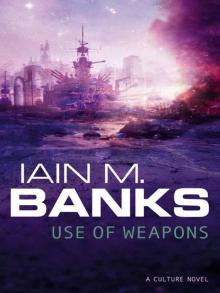 Use of Weapons
Use of Weapons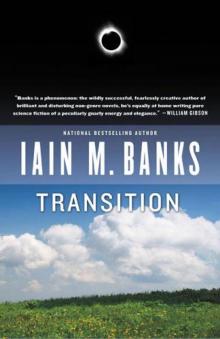 Transition
Transition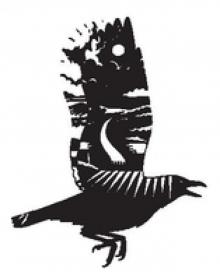 The Crow Road
The Crow Road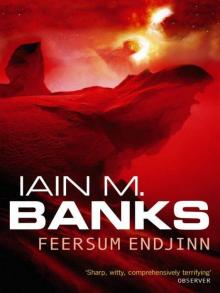 Feersum Endjinn
Feersum Endjinn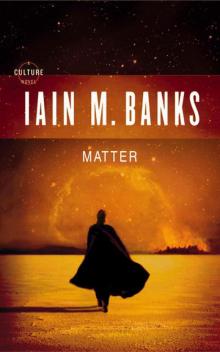 Matter
Matter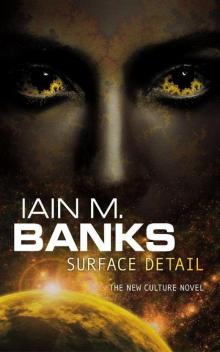 Surface Detail
Surface Detail The Wasp Factory
The Wasp Factory Consider Phlebas
Consider Phlebas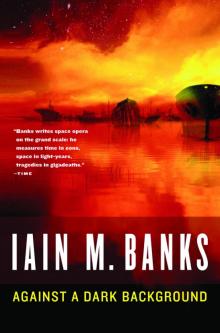 Against a Dark Background
Against a Dark Background Excession
Excession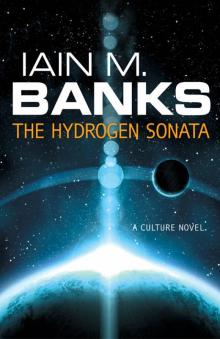 The Hydrogen Sonata
The Hydrogen Sonata The Algebraist
The Algebraist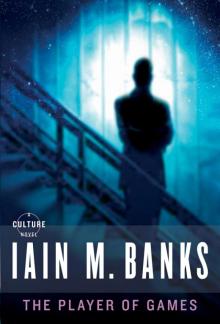 The Player of Games
The Player of Games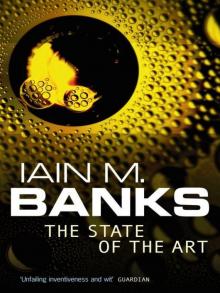 The State of the Art
The State of the Art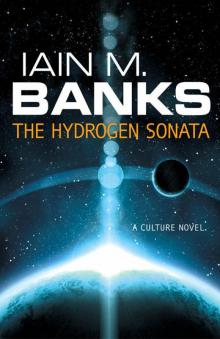 The Hydrogen Sonata c-10
The Hydrogen Sonata c-10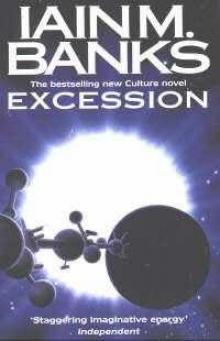 Excession c-5
Excession c-5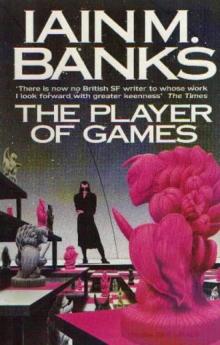 The Player of Games c-2
The Player of Games c-2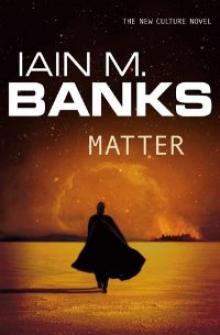 Matter c-8
Matter c-8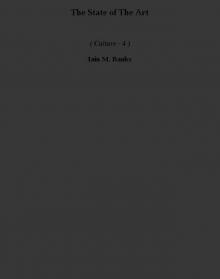 The State of The Art c-4
The State of The Art c-4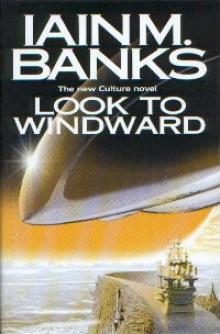 Look to Windward c-7
Look to Windward c-7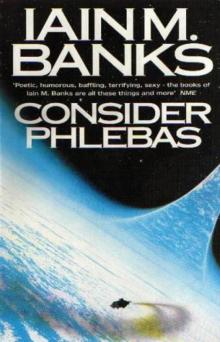 Consider Phlebas c-1
Consider Phlebas c-1